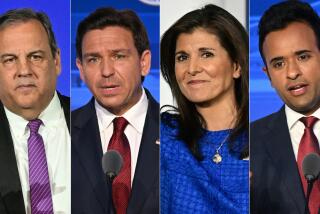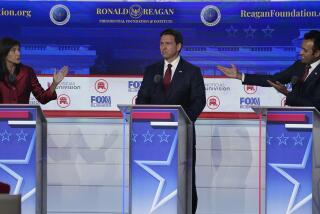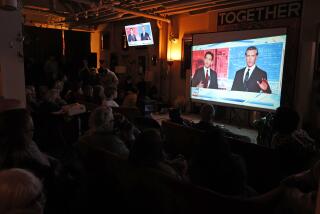NEWS ANALYSIS : 3 Battle Plans Prepared for 3-Way Debate Tournament
For President Bush, the goal in the forthcoming campaign debates is to turn the electorate’s attention away from the nation’s economic malaise and toward the shortcomings of his Democratic challenger, Bill Clinton.
For the front-running Clinton, the objective is to weather the anticipated fusillade of attacks from Bush and prove to undecided voters that he can handle the burdens of the presidency.
As for independent Ross Perot, who re-entered the campaign last week, the goal is to regain some of the credibility he enjoyed as a tough-minded problem-solver before he took himself out of the race last July.
These are the broad parameters within which advisers to all three candidates are mapping out strategies for the unprecedented nine-day tournament of televised debates--three presidential and one vice presidential--that kick off Sunday.
Never before have so many presidential debates been crammed into such a brief period. In 1976, the three encounters between then-President Gerald R. Ford and challenger Jimmy Carter extended over a month. And never before have three presidential candidates confronted each other on the same stage.
Given the uncertainties stemming from these unique circumstances, it is no wonder that the high commands of both major party nominees were pervaded by ambivalence about whether to undertake the debates.
By some accounts, Bush’s chief of staff, James A. Baker III, was not persuaded until the last minute that the risk of investing so much of the President’s precious campaign time was worth the gamble.
“Baker was just going to tell everybody to go stuff it,” said one source close to the Bush campaign organization. “And then he saw nothing else was working and so he decided to roll the dice.”
And within the Clinton campaign, some advisers questioned whether they should put their lead in jeopardy by joining in the debates. “We had presumed that it (a presidential debate) wasn’t going to happen, and we had reached the point where we were quite content with it not happening,” said Stanley Greenberg, Clinton’s pollster.
By contrast, in the Perot camp, there seems to be not one whit of hesitation about joining in the debates.
“We think the debates are an absolutely fine forum for discussing the issues,” declared Orson Swindle, executive director of Perot’s political organization, United We Stand.
For all the hullabaloo over the debates, no one believes that these events by themselves can reverse the course of a campaign that has been running steadily in favor of Clinton and against the President since the midsummer Democratic and Republican conventions.
Instead, Bush strategists see the debates as one part of their overall effort to make voters uneasy about their Democratic foe. Another component of this strategy, they said, is an advertising campaign that got under way last week with a controversial commercial implying that Clinton would boost taxes on middle-class workers.
“The premise is that the more people learn about Clinton and his plans, the better off we are,” said Charles Black, senior adviser to the Bush campaign. “The debates are not the whole campaign. But they are a critical part of it because the news media focus will be on them.”
The preliminary battle plan calls for the President to use the debates to dramatize a broad range of contrasts with Clinton, ranging from such issues as health care and deficit reduction to character, according to Bush pollster Fred Steeper.
“Our candidate is of high moral character, and our opponent is, in the words of the voters in our focus groups, a little too slick and slippery,” Steeper said.
“What he (Bush) is going to try to do is savage Clinton,” said Kathleen Jamieson, dean of the University of Pennsylvania’s Annenberg School for Communication. “I think the election is beyond Bush helping himself. The best he could do would be to make Clinton look bad.”
For their part, Clinton’s advisers said that their candidate is ready to fend off whatever brickbats Bush hurls at him--and give back as good as he gets.
“He has had a lot of warm-up,” said Greenberg, referring to the various controversies over past personal behavior that have surrounded Clinton’s campaign since the New Hampshire primary.
“Bill Clinton will respond and respond strongly,” he added. “In the debates the way to get into trouble is to be cautious.”
Further, simply by appearing on the stage with Bush and arguing face to face over issues, Clinton’s advisers believe that their candidate gains stature in the minds of voters who are currently inclined to vote for the challenger but not totally convinced.
“We need to seal the deal,” said George Stephanopoulos, the campaign’s communications director. “Once you see him (Clinton) side by side with Bush, you can imagine him as President.”
As for Perot, associates expect the independent candidate, who officially announced his candidacy only last week, to try to depict himself as above the partisan scuffling in which Bush and Clinton are expected to become embroiled.
“He will try to avoid personal criticism of either man,” said James D. Squires, who served as spokesman for the Texas tycoon in the early stages of his candidacy. “He will try to keep the discussion on the deficit and creation of jobs. The minute they try to get off those subjects he’s going to say: ‘Why aren’t you talking about these important things?’ ”
Meanwhile, advisers to both Bush and Clinton must try to factor Perot’s tactics into their own plans.
“I think the up side for us is that Perot will focus attention more on the budget deficit, and this helps us more than Clinton,” said Steeper, who is counting on Bush making a persuasive case that Clinton’s economic proposals will add to the deficit.
But Steeper admits there is reason for concern that Perot, who appears to harbor a much deeper animus toward Bush than Clinton, might vent his feelings during the debate.
“That’s a risk we’re taking,” he said. “If two-thirds of what people hear is anti-Bush, that’s not going to help.”
Greenberg said he thinks that Perot’s presence in the debates works to Bush’s disadvantage, if only because he will make it more difficult to pick a clear winner between Bush and Clinton--and Bush needs a victory far more than front-runner Clinton.
Still another factor that Greenberg and others believe could diminish the impact of the debates is having three face-offs compressed into a short period of time.
Thus the danger that one of the candidates could be hurt by a gaffe is reduced because the erring contender would be able to correct his blunder within a few days.
Setting aside these uncertainties, here are the potential assets and liabilities for each of the candidates:
George Bush
Pros--As the only man on the stage who has actually sat in the Oval Office and run the government, Bush can exploit that know-how to intensify doubts about his untried rivals--particularly in foreign policy, an area where, Jamieson suggested, Bush’s experience and success give him an opening to show the others up.
Still another potential asset, analysts said, is Bush’s status as an underdog. But the trick, they pointed out, is to get voters to empathize with him without seeming to sound as if he’s feeling sorry for himself.
Cons--”Bush has to practice standard English sentences, and he needs to stop flapping his arms,” said UCLA political scientist John Petrocik. “He has to look like the sort of guy you go to if you have a problem.”
The President also needs to avoid hitting at Clinton too hard, his aides believe. “When you ring up negative information, you run the risk of a backlash,” Steeper said.
Bill Clinton
Pros--Clinton has had more recent experience at debating than either of his rivals and is usually more facile, Jamieson said. “He doesn’t have to fall back on the same assertion he has just made as a second or third line of defense in an argument,” she said.
Cons--One major concern of Clinton advisers, sources said, is that their candidate tends to give long, complicated answers that frequently strike voters as evasive. Another potential weak spot is Clinton’s tendency, which shows up in interviews and press conferences, to respond to a tough question with a complaint against the questioner instead of an answer.
Ross Perot
Pros--His strong suit is what ignited interest in his candidacy in the first place: his status as a successful entrepreneur and non-politician. If he actually sticks to the issues, as he reportedly plans to do, he has a chance of taking the high ground away from Bush and Clinton and restoring his early public image as what Petrocik calls “a vessel of hope--a businessman who has clearly achieved something and said: ‘Okay, I’ll step up to the plate and take a swing.’ ”
Cons--While Perot’s outsider stance helps him in some ways, it could turn into a negative, political professionals contended, if he seems uninformed or uncaring about matters a President should know about. And his reluctance to put up with questions he deems irrelevant could also get him in trouble if it makes him appear arrogant and short-tempered.
Times staff writer David Lauter also contributed to this story.
More to Read
Get the L.A. Times Politics newsletter
Deeply reported insights into legislation, politics and policy from Sacramento, Washington and beyond. In your inbox three times per week.
You may occasionally receive promotional content from the Los Angeles Times.






